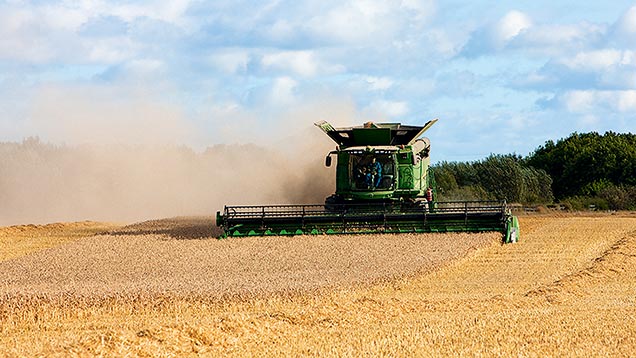Crown Estate responds to TFA 10-year tenancy call

Following the Tenant Farmers’ Association call for a minimum 10-year farm business tenancy (FBT) term, Ken Jones, director of the Crown Estate’s rural and coastal portfolio, responds, arguing for flexibility.
Agriculture sits alongside energy, water and housing in that it meets a basic human need. Without successful, sustainable businesses in these industries, operating in markets that work, life as we know it would change dramatically.
Yet, few days go by without headlines about the scale of pressures farmers face – supermarket price wars, volatility in global markets, commodity prices and flooding.
That’s why it’s vitally important that landowners, tenant farmers and their representatives, government, and non-government organisations work closely to address these issues. By doing so, sustainable and profitable solutions can be found for all parties, which in turn helps to build a strong agricultural industry.
See also: Give tax relief only on longer farm business tenancies – TFA
Have your say
What do you think – have FBTs encouraged more lettings in your area? Should there be a minimum term for landlords to qualify for tax relief? Does it matter that new entrants are often outbid by established farmers? Get in touch by email or write to:
Farmers Weekly
Quadrant House
The Quadrant
Sutton
Surrey SM2 5AS, UK
Many seek to paint the landlord and tenant relationship as one characterised by conflict, but we contest this. There will always be times when a landlord and tenant don’t agree – that’s the nature of business – but it is in our interest for our tenants to do well.
If they perform well, so do we, and I regularly see examples of innovation and partnership working between farmer and landowner that are helping to shape successful and sustainable businesses.
Farm business tenancies were created in 1995 to create more flexible working arrangements between landlords and tenants.
In the spirit that the legislation was intended, we also believe in varying the length of our tenancies to suit both the particular circumstances of our tenants as well as ourselves.
Commercial objectives
Ultimately, our ability to meet the commercial objectives set out by Parliament – to grow the value of the portfolio and generate growing income returns for the benefit of the public finances – would be negatively affected by minimum lease terms, which would have a destructive effect upon capital values.
The Crown Estate is an active manager of over 136,000 ha of tenanted farmland, which has a capital value of more than £1bn. More than £400m of that is let across the UK on FBTs.
To meet our performance objectives we believe in investing in our land for the long term. We let land at market rates to the best-performing farmers in an effort to form relationships that are beneficial to both us and our tenants.
Minimum lease terms would impinge upon the performance of the business and lead us and similar landlords to re-examine the case for continuing to hold this type of land. Landowners would also seek alternative means of making land available to the market, such as contract farming.
The net result of this would be a further restriction of let land supply in a market already characterised by scarcity. This could only be a bad thing for agriculture.
Progressive landlords want to work with progressive tenants, the most effective and efficient in the industry. Our recent lettings prove this type of tenant is not put off by shorter lease terms – many end up occupying well beyond 10 years.
Partnerships
Working in partnership with our tenants can take a number of forms. Sometimes it means making capital available to help tenants diversify or invest in new facilities.
For example, one of our tenants has been keen to meet the challenges facing the dairy industry by applying innovative techniques for feeding and accommodating cattle.
This gave us the confidence to make a £500,000 capital investment in a state-of-the-art new barn for the tenant, which will help drive his business forward – and in turn benefit our own.
Helping retirement
We have also made more land available to help thriving businesses grow by working to proactively help agree retirement strategies with older tenants to bring back land to the market.
For example at Bingham, in Nottinghamshire, we recently helped a 65-year-old tenant to retire and re-organised the holdings, letting them to two local farmers keen to take up five-year FBTs. This made more efficient use of good-quality agricultural land and enhanced our commercial performance.
The Crown Estate is a commercial business brought into being by an Act of Parliament. It hands over its entire surplus each year to HM Treasury, effectively paying 100% tax. Hence the income and inheritance tax aspects of the TFA’s call for a minimum 10-year FBT would not apply to this business.
Our approach is to first and foremost deliver on the commercial mandate we’ve been given. There is no silver bullet to ensuring sustainable agricultural businesses can continue to grow. One thing is clear, however, and that is the importance of active partnerships between landowner and farmer.
This is something that The Crown Estate works hard to achieve, and which we recognise in many of our tenants too.
Tenants that demonstrate an ability to adapt and innovate and who show a commitment to the long-term sustainability of the land inspire confidence and lay the foundations for practical solutions that can deliver good outcomes for both parties.
